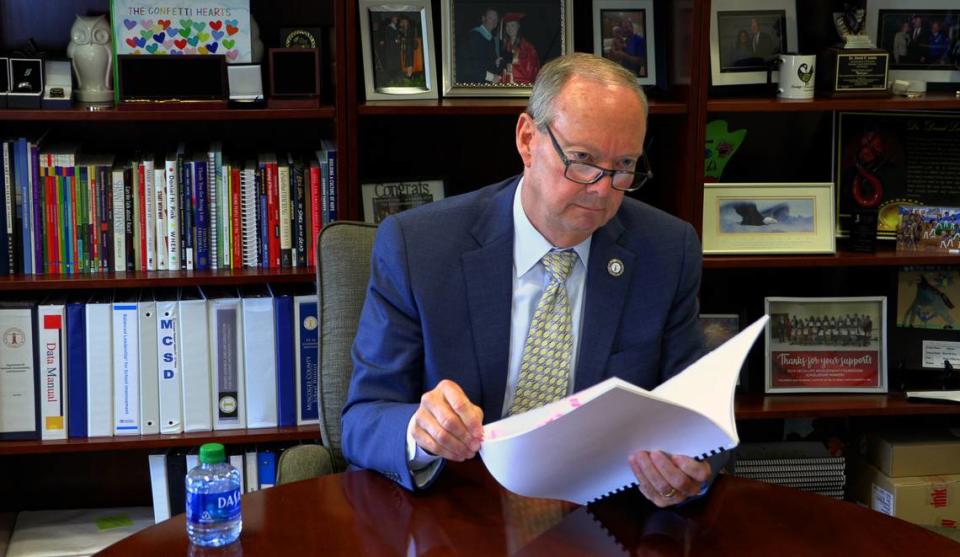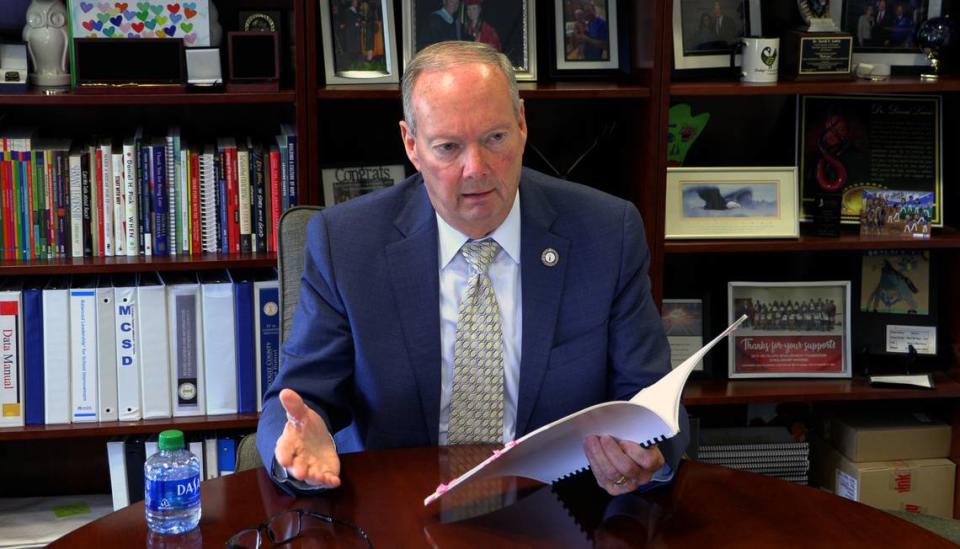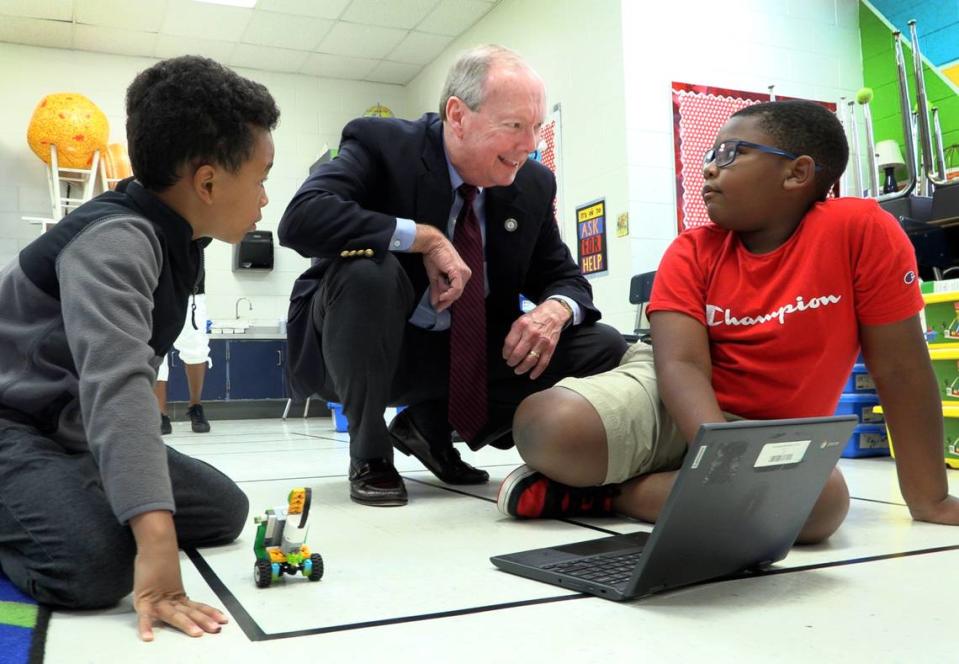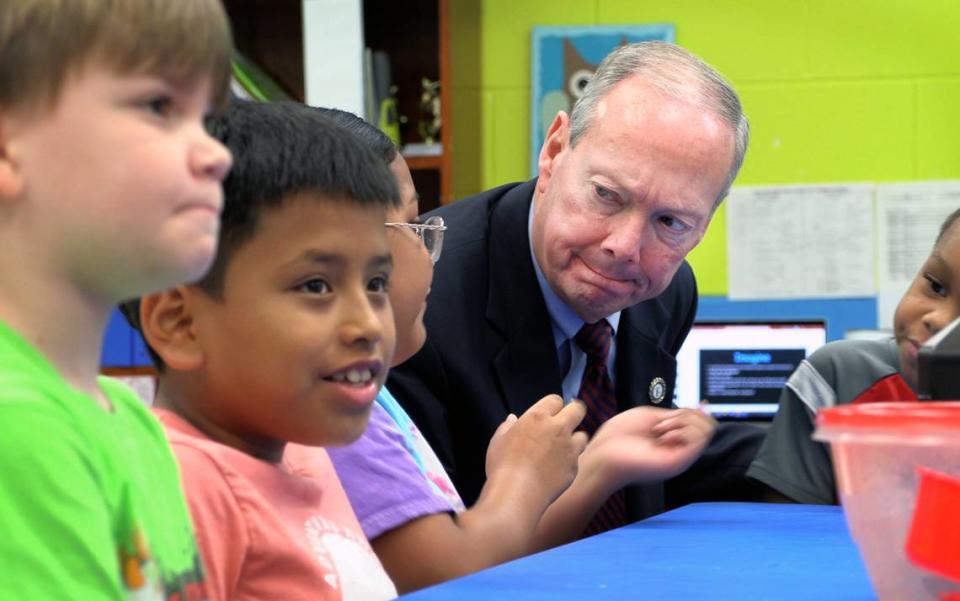How Muscogee school district rates under superintendent, and how has he lasted 10 years?
The national average for the length of a school district superintendent’s tenure is considered around three years. This month marks 10 years since the Muscogee County School District board hired David Lewis to lead the system of nearly 30,000 students and more than 5,000 employees.
Lewis has overcome tough times. Two now-former board members and their followers made meetings so contentious, Lewis darted from the dais in 2018 to defend his wife from a heckler in the audience.
Asked to explain his resilience, Lewis credits support from his family, staff and the majority of the board and community.
“Knowing you can persevere with that support and just being internally resilient and being a person of faith and anchoring to that has been what I would say carried me through,” Lewis told the Ledger-Enquirer last week.
Lewis, 66, ranks third in length of tenure among the nine leaders who served as MCSD superintendent or interim superintendent since the Columbus public schools merged with Muscogee County’s in 1950, trailing William Henry Shaw’s 23 years (1950-73) and Braxton Nail’s 16 years (1973-89).
After the board hired Lewis in July 2013 from Polk County, Florida, where he was an associate superintendent, he focused his first six months as MCSD superintendent assessing the system and developing a 10-year plan to improve the district’s performance.

The plan comprises six priorities:
Full-option graduation, meaning graduates are academically prepared to enter the workforce, military or postsecondary educational institution directly after high school.
Learning. Prepare all students to meet or exceed expected proficiency.
Equity, culture and context. Ensure that all students have access to a high-quality school environment.
High-quality staff. Recruiting, selecting, inducting and sustaining highly effective employees.
Operations. Having efficient and effective operations in finance, human resources, facilities, transportation, technology, security and materials management.
Communication and transparent accountability so stakeholders understand how decisions are made, on what facts, data or research they are based and what opportunities they have to be informed or contribute to the decision-making process.
Ten years later, how does MCSD measure against that plan?
Academic progress for Muscogee schools
The Georgia Department of Education hasn’t released the 2023 data, but according to the statistics from 2013 to 2022, MCSD is at all-time highs or exceeds the cohort, state or national averages in the major metrics.
MCSD’s graduation rate has improved from 72.8% in 2013 to 92.04% in 2022, the 10th consecutive year outperforming the state average and the eighth outperforming the national average.
For college entrance exams, MCSD’s average score on the SAT has improved from 1435 out of 2400 points in 2013 to 1059 out of 1600 points in 2022, the fourth straight year outperforming the state and national averages. MCSD’s average score on the ACT has improved from 19.8 out of 36 points in 2019 (the oldest data available for district averages) to 20.1 in 2022.
On the Advanced Placement tests, the number of students scoring at 3 or above on the 5-point scale, which is considered passing and sometimes acceptable for college credit, is at an all-time high. MCSD also is at an all-time high and surpassed the state average on the percentage of students in Career, Technical and Agricultural Education completing a three-course program.
That academic improvement came while the district’s percentage of students qualifying for free or reduced-priced meals increased from 71.7 in 2013 to 79.6 in 2022.
On the state’s standardized tests, the Georgia Milestones, which were implemented in 2015, MCSD improved in most categories through 2019 but has declined in most categories since the COVID-19 pandemic. For example:
In third-grade English language arts, 30% of students were at least proficient in 2015, 34% in 2019 and 27.7% in 2022. In third-grade math, 33% of students were at least proficient in 2015, 37.6% in 2019 and 27.6% in 2022.
In fifth-grade English language arts, 26% of students were at least proficient in 2015, 38.7% in 2019 and 32.2% in 2022. In fifth-grade math, 33% of students were at least proficient in 2015, 29.2% in 2019 and 21.7% in 2022.
In eighth-grade English language arts, 32% of students were at least proficient in 2015, 41.9% in 2019 and 32.9% in 2022, In eighth-grade math, 29% of students were at least proficient in 2015, 36% in 2019 and 25.8% in 2022.
Despite the decrease in those scores since the pandemic, MCSD outperformed its cohort on 80% of the 2022 Georgia Milestones tests. Those are the school districts in cities with similar size and demographics to Columbus: August (Richmond County), Macon (Bibb County) and Savannah (Chatham County).
Other metrics for MCSD
MCSD’s fund balance was down to approximately 23 days of expenses when Lewis became superintendent in 2013. Now, the fund balance is around 62 days with budgeted expenditures of $342.5 million from the general fund this fiscal year. School districts try to be at least at the 60-day level to receive the best bond ratings and the best interest rates for capital projects.
And MCSD has continued to receive public votes of confidence during Lewis’ tenure with the 2015 and 2020 renewals of the ESPLOST (Education Special Purpose Local Option Sales Tax) to raise hundreds of millions of dollars for capital projects, such as building new facilities and renovating, expanding or updating existing ones.
Stakeholders assess MCSD superintendent
The Ledger-Enquirer tried to gather input from leading stakeholders by sending a survey to MCSD board members, the Muscogee Educational Excellence Foundation and local representatives of the PTA, the Georgia Association of Educators and the Professional Association of Georgia Educators.
Two of those leaders submitted their answers. They gave Lewis rave reviews. Neither was critical.
MCSD board chairwoman Pat Hugley Green of District 1 praised the progress toward “closing the gap in student achievement” under Lewis’ leadership.
“Our students and families are benefiting from specific achievements in areas from improved targets in early literacy with centralized web-based reading curriculum for consistency throughout all schools to multiple pathways for full-option diplomas for every graduate through college readiness and CTAE (Career, Technical and Agricultural Education),” Green told the Ledger-Enquirer in an email.
Sarah “Sam” Shehane, the Georgia PTA District 4 director and past Muscogee County Council of PTAs president, lauded Lewis for providing stakeholders opportunities to contribute their input, including attending “almost every” PTA council general board meeting during his tenure.
“Dr. Lewis is supportive, passionate about education and continues to be a positive influence on our community,” Shehane told the Ledger-Enquirer in an email.
Q&A with MCSD superintendent David Lewis
In your plan 10 years ago, you said the district was poised for greatness. Has MCSD achieved greatness?
“I think we’re in progress toward that. I’m not sure if you ever get there, if it’s ever a destination. It’s an ongoing journey because we see there’s always things we have to adjust and adapt to.”

What are you most disappointed about as superintendent here?
“The biggest disappointment was the pandemic. It’s the single-biggest challenge I have faced, and probably any educator or leader anywhere would probably say (the same) in their career. … Put it in perspective: It was my disappointment, but others had shear tragedy in their lives. … We know we’ve got children who missed inordinate amounts of school. We’ve got kids at all different places along the continuum. We’ve got to start with pre-K through third grade, making sure they have the capability to read on grade level, do basic math on grade level, and then we can work on the rest of it upstream.”
In your pre-K through third grade initiative, what will students and parents notice that will be different about the instruction from teachers?
“They will see much more intentionality and personalization and much more focus on the science of reading, … which we’ve learned more about from research and evidence-based instruction. … By partnering with the Rollins Center and by embedding those evidence-based but more importantly classroom-proven strategies, we’ll see kids being able to read more proficiently on grade level by third grade.”
What’s an example of teaching the science of reading?
“Well, last year, we started it. You see much more explicit instruction in phonics, phonemic awareness. That’s like letters and sounds.”

What’s your most significant failure as superintendent?
“Nothing comes to mind because if it doesn’t accomplish what I want, I think about a way to get there: Build another plan; build another bridge; build another approach; take another tactic. If we know it’s the right thing to do, and we don’t do it, it’s malpractice.”
For example?
“I felt there was a real need to develop a better continuum for our special-needs students. We approached the board (in 2017) about one particular third-party vendor (Camelot) we wanted to use. That didn’t work out, but there was a realization. The board came to realize we still needed the services. So (two years later) we went with another vendor (ChanceLight), another third-party contractor they felt like would better serve our community and our district.”
What did you learn during your first several years here that might have prompted you to change the way you lead MCSD?
“You’ve got to be resilient. As you may recall, the first few years were tumultuous. They were difficult, and they were challenging. But I knew I was doing the right thing in my heart of hearts . . . to do the work on behalf of the children we serve and the community at large. . . . And we persevered.”

What was tumultuous, and how did you persevere?
“Well, the community took care of that (in the 2018 election), quite frankly. We had a couple of board members at the time that were not as supportive of the direction we were taking the district. I certainly respect that, and I will always respect anyone’s opinion to share a difference of a opinion. However, it’s not the what; it’s the how. And when the community as a whole saw there was a need for a change, they enacted change.”
When you went through those tough times, how did that affect you, and how did you rise above it?
“I can’t imagine going through a job like this without having a supportive spouse. My wife, Karen, and frankly all of my children, who are grown now, they’ve always been very supportive. That’s critically important, to have that sounding board, that grounding and be able to bounce off thoughts and ideas and to generally support what you’re doing.
“We have community groups that are so very supportive. I can’t go into all of them, but so many people, individually and collectively, have been so supportive of me and what we’re trying to accomplish here. … As a person of faith, I’m convinced that God puts people in your life at the right point in time to help undergird and support you when you need it most.
“As far as critics and so on, I don’t want this to sound trite, but I talked to a mentor of mine who was a longtime superintendent in Florida. One of the best pieces of advice I received from him was, ‘Never pay too much attention to criticism from those from whom you would not seek advice.’ ”
What are you most proud of about your superintendency?
“I think the affirmation from stakeholders, be they teachers, support staff, principals, community members. Those are the people I serve. I’m here to serve. Of course, my board has been supportive. … It doesn’t mean you always agree on everything, but having a good governance team you can trust — you have conversations, you have disagreements — at the end of the day, we’re all doing what you think is in the right and best interests of the students and the community at large. That’s what helps me feel like I’m successful.”

When did that feeling crystallize for you?
“There were three things: The (2015) ESPLOST was very rewarding. Secondly, the (2018 school board) election, when people showed concern about who serves as part of the governance team. Thirdly is graduation. Graduation every year for me is the pinnacle of the whole year and for those children 13 years culminate in that pinnacle of success. … When we talk about our mission to inspire and equip all students to reach unlimited potential, all means all.”
How long do you want to continue in this role?
“To be determined. I have some things we’ve got to get done. I’m very excited about the future goals we have in concert with our (robotics) partnership with CSU that we hope to bring forward in the near future. … One of the big pieces (superintendents) tend to avoid is the school (attendance zone) boundary restructuring. It’s contentious. Many (superintendents) move on before they have to do it, but I feel like it’s the necessary and right thing to do. … Leadership is not easy, and it’s not always fun, but that’s why you’re in the position of leadership: to do hard things.”
What do you most enjoy about doing this job?
“The people. … You cannot do this job well if you don’t like to engage with, interact with, people. And I really enjoy that, whether it’s going out to a ballgame at night, going to a concert, going to a robotics competition on a Saturday. Seeing kids put what they learn Monday through Friday into practice at a concert, at an athletic event, a job opportunity.
“You walk across the campus at CSU, and somebody will say, ‘Hey, Dr. Lewis!’ Or they come back and tell me they’ve gone on to another university and graduated and gotten a job, and they’re bringing their family back. Those are wins. … We have so many great partners. … I just hope the community feels like they’ve gotten their money’s worth, that the investment in me was worth the time and effort that the board put into it, and we all came to the mutual decision that this was a good partnership.”

